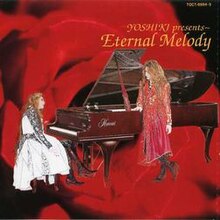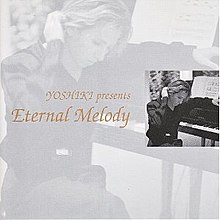| Eternal Melody | ||||
|---|---|---|---|---|
 | ||||
| Studio album by | ||||
| Released | April 21, 1993 December 27, 2001 | |||
| Recorded | February 1993 Air Studio, London | |||
| Genre | Classical | |||
| Length | 75:38 | |||
| Label | Toshiba-EMI, Polydor | |||
| Producer | George Martin | |||
| Yoshiki chronology | ||||
| ||||
| Singles from Blue Blood | ||||
| ||||
| Alternative cover | ||||
 2001 re-release cover | ||||
Eternal Melody is the first classical studio album by Japanese musician Yoshiki. It was released on April 21, 1993.
Overview
In 1991, Yoshiki released his first album, classical compilation Yoshiki Selection, which included various classical works together with orchestral arrangements of songs by his band X Japan. In 1992, inspired by Keith Jarrett's album The Köln Concert, he began learning about jazz improvisation and orchestration. [1]
Eternal Melody was recorded in February, 1993, at the Air Lyndhurst Hall recording studio in London, owned by English record producer Sir George Martin, and mastered at Abbey Road Studios. The music was written by Yoshiki, produced by George Martin, co-arranged with Gavin Greenaway and Graham Preskett, and performed by the London Philharmonic Orchestra. [2]
Besides including orchestral arrangements of X Japan songs, the album also contains two new songs, "Overture" and "Amethyst."
Eternal Melody was followed by Eternal Melody II in 2005.
Release
The album was released on April 21, 1993, by Toshiba-EMI. It reached number six on the Oricon charts in the first week of May, [3] selling 83,740 copies. [4] The following week, it dropped to number nine, with 31,940 copies sold, [5] and in the third week it dropped to number fourteen, with 15,050 copies sold. [6] In the fourth week, it dropped to number twenty five, selling 9,030 copies. [7] The album charted for six weeks in total. [3] It was re-released on December 27, 2001, by Polydor.
Single release
On November 3, two singles written and co-produced by Yoshiki were released: "Amethyst" and "Ima wo Dakishimete", with the second being a karaoke adaptation of the second orchestral song from the first single, which wasn't included in the album.
The first single was released by Toshiba-EMI, as the single of London Philharmonic Orchestra, and co-produced by George Martin, while the second single was released by BMG Japan, and name credit went to TBS, as was the theme song for their drama Tetteiteki ni Ai wa..., and co-produced with drama director Endo Tamaki (from TBS).
In the third week of November, the singles reached number five and three on the charts, with sales of 74,740 and 85,610 copies, respectively. [8] They charted for five and eighteen weeks, respectively. [9] [10] In 1994, "Ima wo Dakishimete" was the 35th annual best-selling single, with sales of 581,610 copies, and won the "Excellence award" at the 36th Japan Record Awards. [11]
The song "Amethyst" was included in his second classical compilation, Yoshiki Selection II, and with "Ima wo Dakishimete" in his second classical studio album, Eternal Melody II.
Track listing
All music is composed by Yoshiki, and arrangers noted
| No. | Title | Length |
|---|---|---|
| 1. | "Overture" | 9:13 |
| 2. | "Vanishing Love" (Graham Preskett) | 4:54 |
| 3. | "Amethyst" (Graham Preskett) | 6:18 |
| 4. | " Kurenai" (Graham Preskett) | 4:43 |
| 5. | " Endless Rain" (George Martin) | 6:17 |
| 6. | "Unfinished" (Gavin Greenaway) | 6:30 |
| No. | Title | Length |
|---|---|---|
| 7. | " Say Anything" (Gavin Greenaway) | 10:07 |
| 8. | " Silent Jealousy" (Graham Preskett) | 4:59 |
| 9. | "A Piano String in Es Dur" (Gavin Greenaway) | 3:36 |
| 10. | " Week End" (Graham Preskett) | 5:55 |
| 11. | "Rose of Pain" (Gavin Greenaway) | 7:34 |
| 12. | " Tears" (George Martin) | 4:24 |
Recording personnel
- Arrangers: George Martin, Gavin Greenaway, Graham Preskett
- Recording, mixing engineer: Bendoru Hayden
- Assistant engineers: Steve Orchard, Jeff Foster
- Mastering engineer: Chris Blair (Abbey Road Studios)
- Performed: London Philharmonic Orchestra
References
- ^ "表紙/巻頭インタビュー YOSHIKI ピアノ、クラシック音楽、これからの活動について大いに語る!". Keyboard Magazine Japan (in Japanese). 1. Japan: Rittor Music Company. January 2003.
- ^ Strauss, Neil (June 18, 1998). "THE POP LIFE; End of a Life, End of an Era". The New York Times.
- ^ a b "Yoshiki Presents~Eternal Melody". oricon.co.jp (in Japanese). Oricon. Retrieved January 2, 2012.
- ^ "Oricon weekly album chart for the first week of May 1993". oricon.co.jp (in Japanese). Oricon. Retrieved January 10, 2012.
- ^ "Oricon weekly album chart for the second week of May 1993". oricon.co.jp (in Japanese). Oricon. Retrieved January 14, 2012.
- ^ "Oricon weekly album chart for the third week of May 1993". oricon.co.jp (in Japanese). Oricon. Retrieved January 14, 2012.
- ^ "Oricon weekly album chart for the fourth week of May 1993". oricon.co.jp (in Japanese). Oricon. Retrieved January 14, 2012.
- ^ "Oricon weekly single chart for the third week of November 1993". oricon.co.jp (in Japanese). Oricon. Archived from the original on 2013-02-18. Retrieved January 14, 2012.
- ^ AMETHYST/ロンドン・フィルハーモニック・オーケストラ. oricon.co.jp (in Japanese). Oricon. Retrieved January 14, 2012.
- ^ 今を抱きしめて/NOA. oricon.co.jp (in Japanese). Oricon. Retrieved January 14, 2012.
- ^ 第36回日本レコード大賞. jacompa.or.jp (in Japanese). Archived from the original on October 19, 2013. Retrieved October 20, 2012.